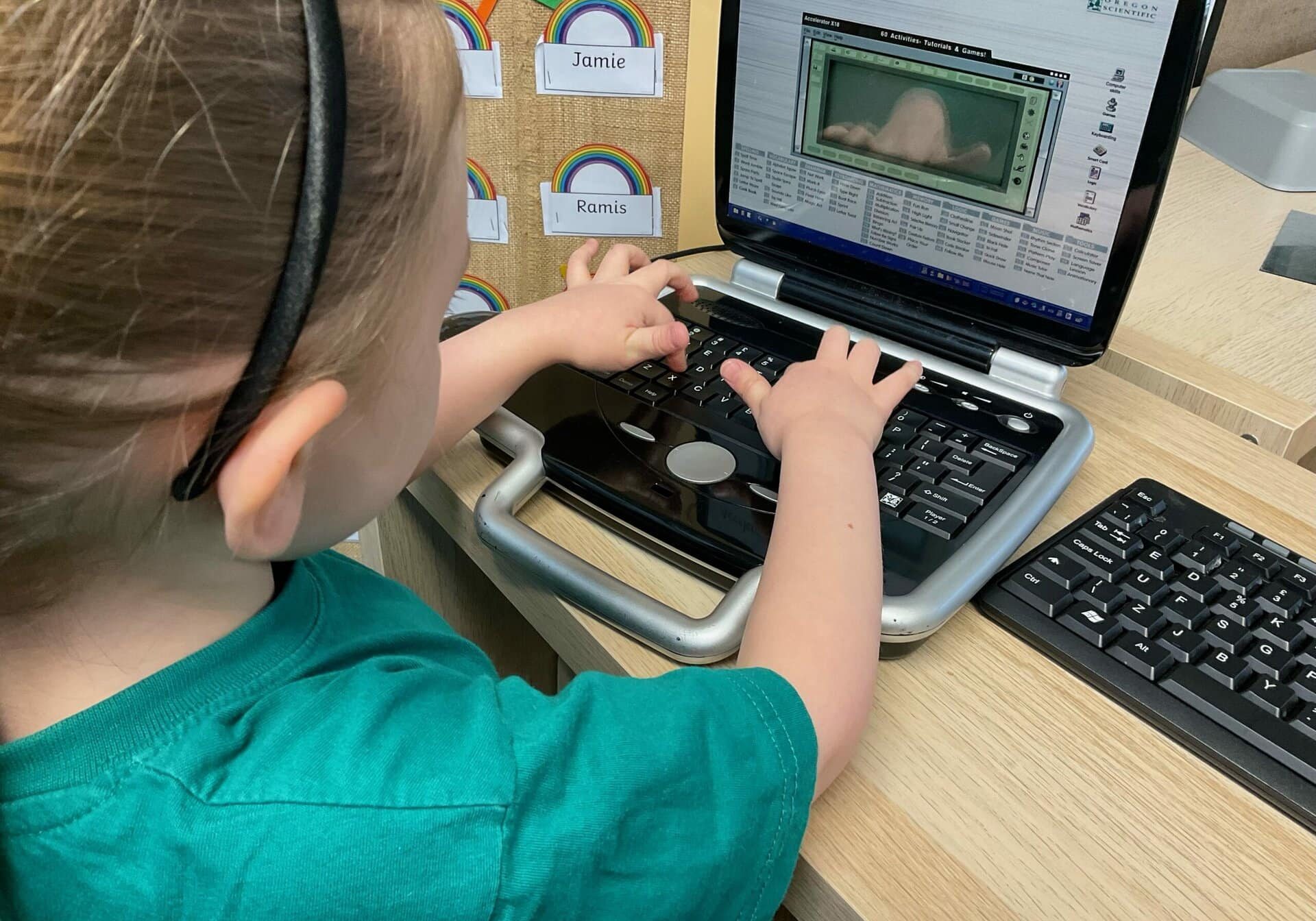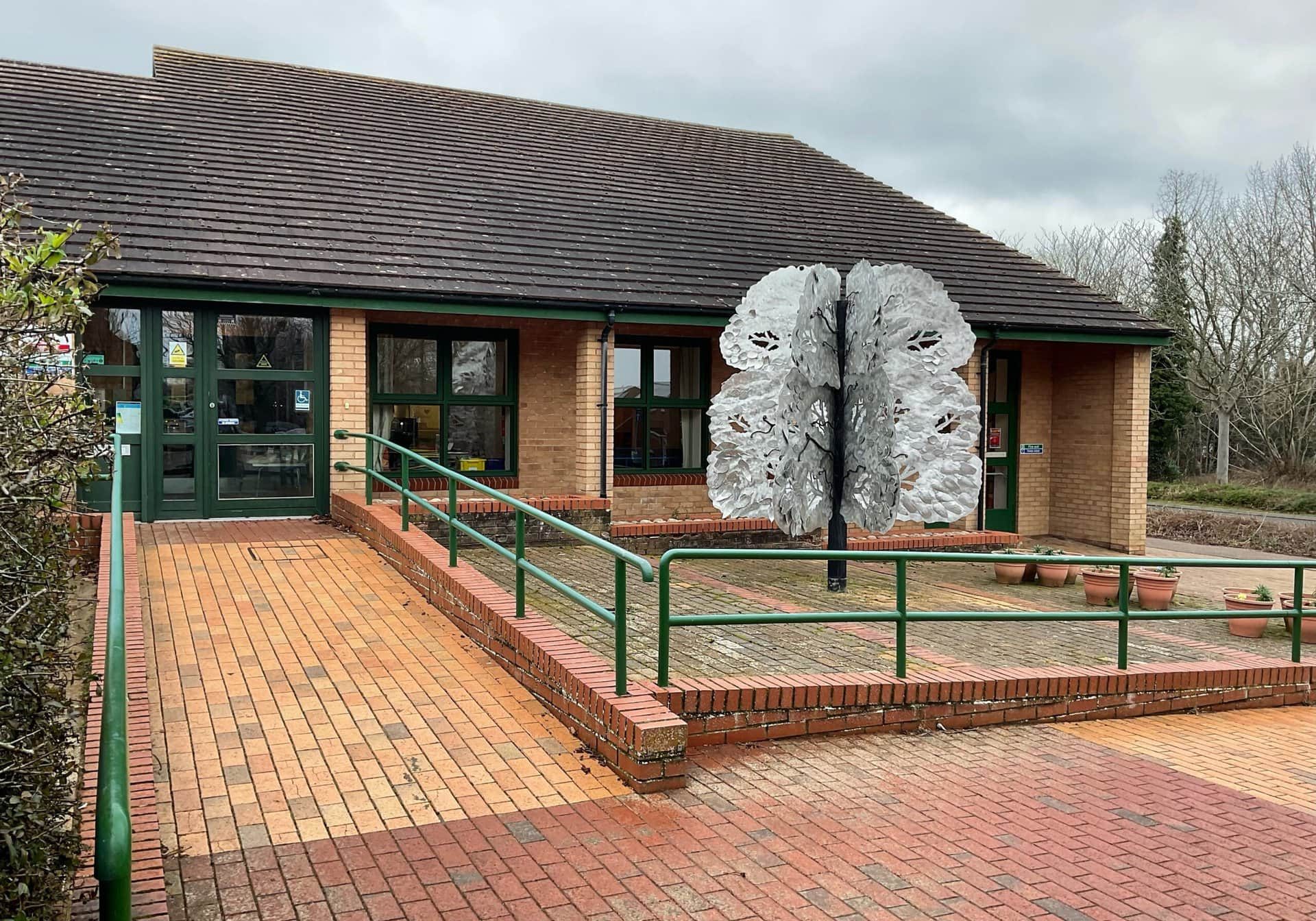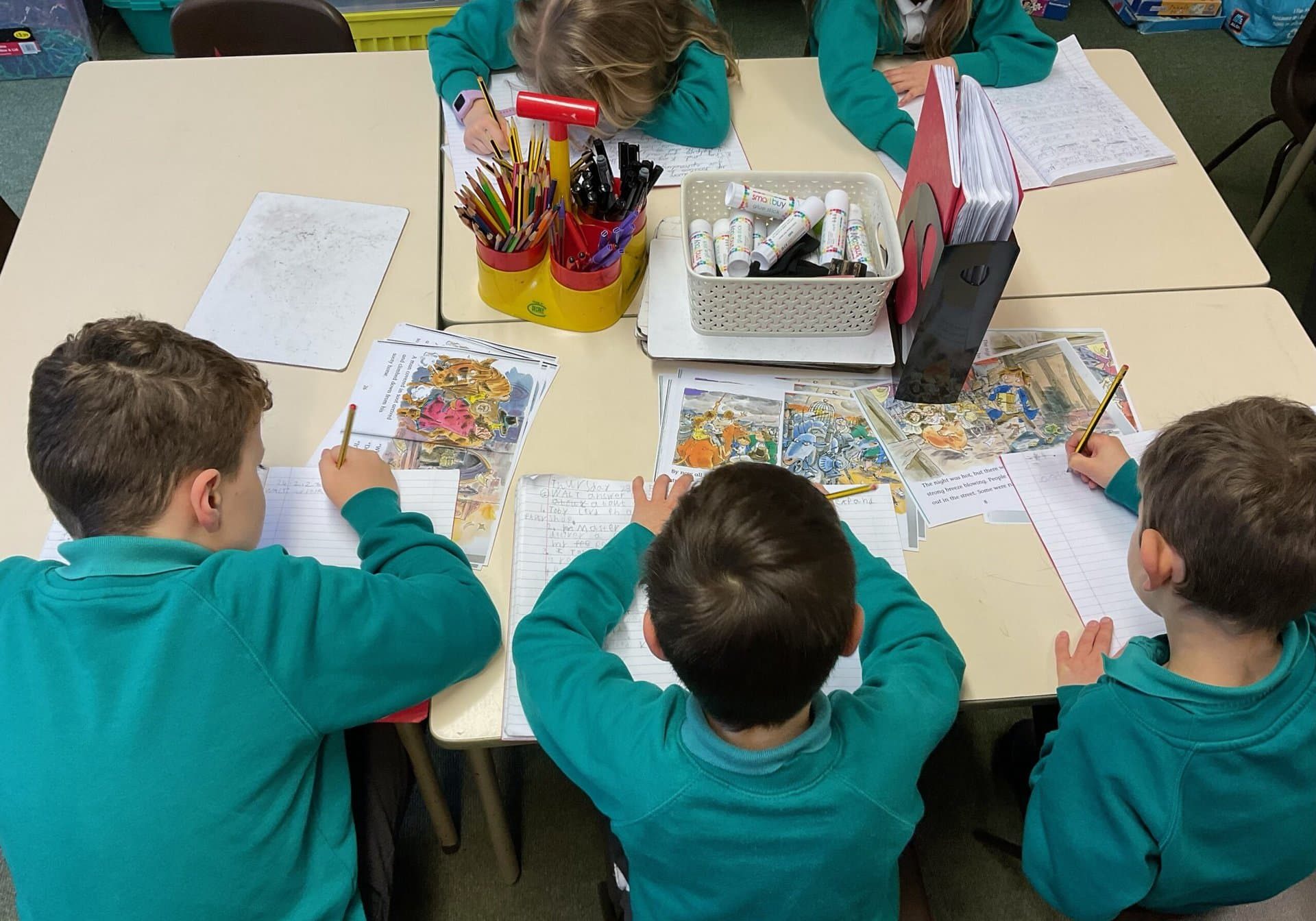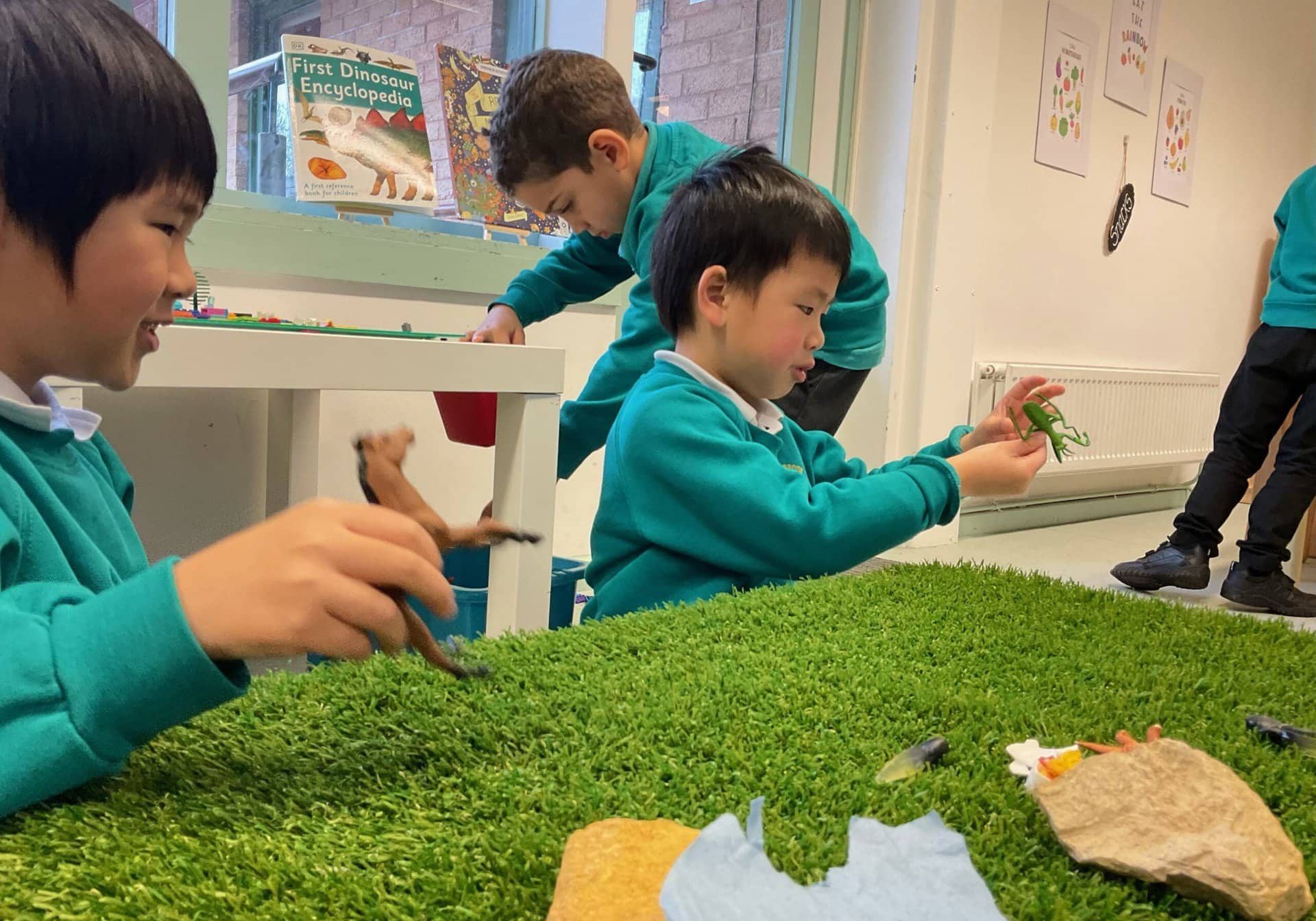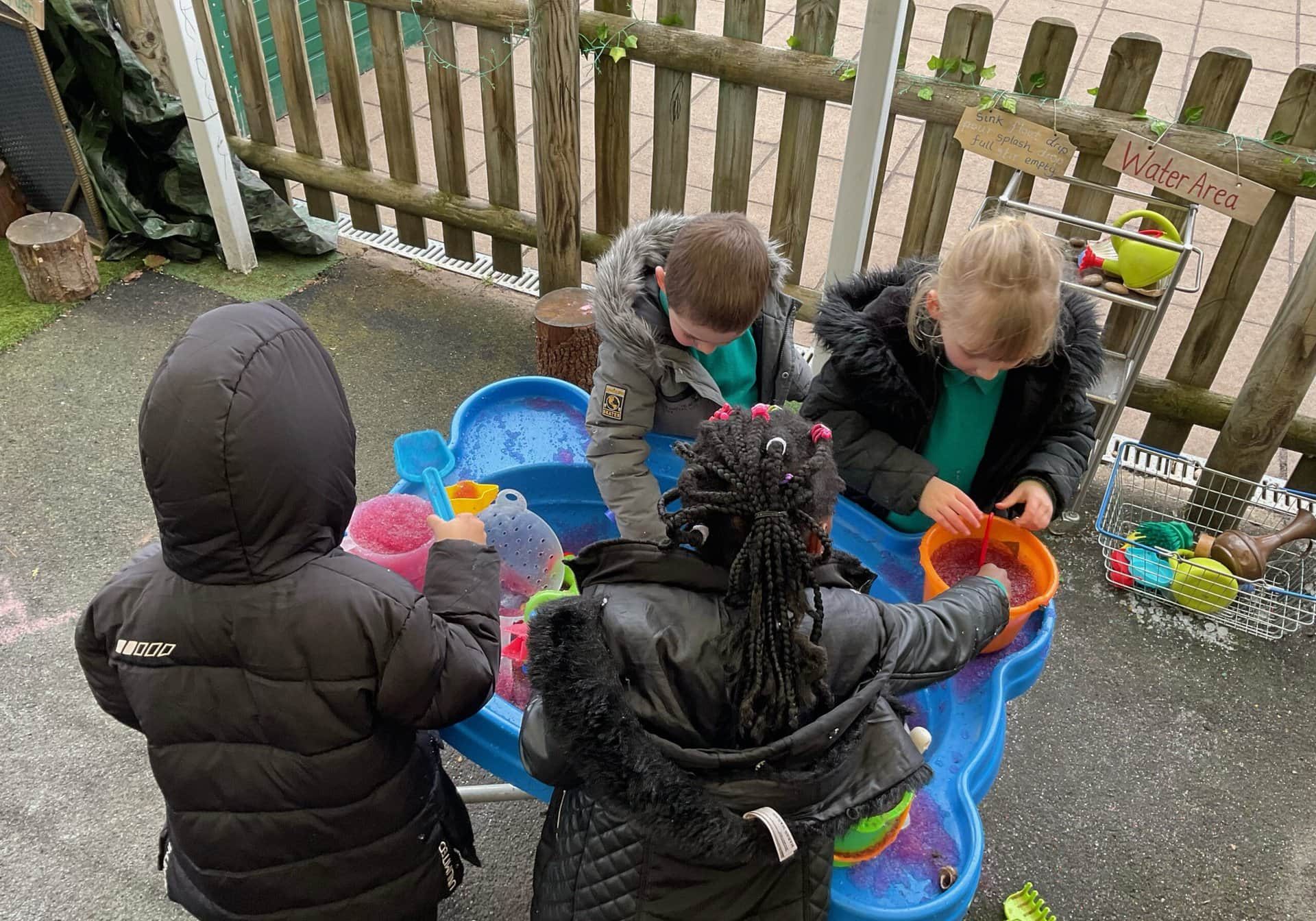Foundation subjects
All our foundation subjects have been carefully planned and devised to ensure that each key objective is carefully sequenced, following our progression documents, so that each pupil, year on year, will develop key knowledge and skills to progress. Each skill is built upon year by year to embed key knowledge, giving pupils a wider understanding of the world around them and the knowledge, skills and understanding that they need to progress and achieve higher standards and prepare them for the next stage of education.
At Ashbrook School, we believe that art stimulates creativity, imagination and inventiveness. We believe that through the teaching of art, our pupils are given the skills and knowledge necessary for them to express responses to ideas and experiences. It fires their imagination, whilst instilling a sense of calm and positive wellbeing, making art and design a fundamental area of our curriculum.
We strive for our children to be excited, inspired and passionate about art and design. We strive to ensure that all children are given opportunities to explore a range of media, and experiment with colour, texture, form, pattern and different materials and processes. Self-evaluation of work is encouraged and children are taught how to develop and critique their own work. From Reception, we provide children with a broad and exciting art curriculum which allows them to develop their artistic skill, gain knowledge and develop confidence when using subject specific vocabulary, which continues progressively until the end of KS1.
Our teaching of art and design follows three main strands: drawing (using a range of media such as pencil, charcoal, oil pastels and chalk), painting (to explore colour) and sculpture. Children are also provided with a wealth of additional art experiences such as collage and printing. This enables the children to leave our school at the end of KS1 with a range of different art experiences, skills, knowledge and a love of art. We ensure that children explore a diverse range of artists and sculptors from various cultures and periods of time, and we encourage our children to form opinions of their work.
“Art is not just a subject to learn, but an activity that you can practise with your hands, your eyes, your whole personality.”
Quentin Blake
We strive for our children to become artists; creators, critics and lovers of art and design.
Art and Design Curriculum Pathway
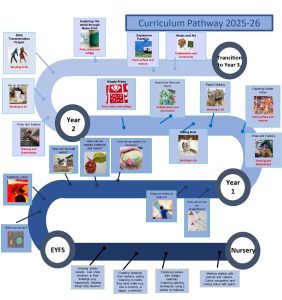
Children at Ashbrook School learn about computing and internet safety through structured, developed lessons. Computing capability is an essential skill for life and enables our learners to participate more readily in a rapidly changing world. Using the internet and email, for example, gives them rapid access to ideas and experiences from a wide range of people, communities and cultures.
We are excited to have been part of the 1:1 iPad initiative for all Year 2 pupils. Each child is provided with their own iPad to use in school every day.
The initiative allows pupils to work at their own pace, access adapted resources to make the learning more personalised. Children develop essential skills to navigate technology safely and effectively. Teachers use a range of apps and tools to make learning more engaging and interactive to enable the children to work collaboratively with their peers.
Learning about internet safety is vital and every year we set aside a week to ensure this is embedded appropriately for their age, as well as how to be a SMART learner.
The children will learn to experience and develop skills that will help them make the most of adult life. Information technology isn't simply about computers, it includes anything that requires the input of instructions to produce specific outcomes e.g. cameras, calculators, digital devices. The children have opportunities to program floor robots, write their own algorithms and codes, and problem solve when they don’t go according to plan.
At Ashbrook School we strive to provide all children with an exciting, broad curriculum which will prepare them for life beyond the primary education setting. It is our mission to provide our children with experiences and opportunities within our design and technology curriculum which will promote creativity and imagination, allow the children to think critically to solve problems within a range of contexts and provide opportunities for children to design, make and evaluate products for purpose.
Design and technology is an exciting and inspiring subject which requires children to develop their practical skills and knowledge when working creatively. It allows children to consider real problems and think critically about solutions. Our design and technology curriculum is covered across the strands: structures, mechanisms, textiles and cooking. Within each area, children will receive high level teaching and learning with the opportunity to design, make and evaluate. Our design and technology journey begins immediately, from Reception, and continues all the way through to the end of KS1, ensuring a clear progression with regards to experiences, skills, progression and key vocabulary. We aim to link our learning, where possible, to other areas of the curriculum to allow the children to fully immerse themselves in their learning experience.
At our school, we encourage the children to take risks, become innovators and think outside of the box. Our design and technology curriculum allows children to:
- Experience and develop technical skills with growing confidence
- Develop a repertoire of knowledge to aid their understanding of key concepts, understanding of product design and knowledge of relevant tools and equipment
- Immerse themselves in key vocabulary linked to their learning
- Design, make and evaluate products within a range of contexts for a range of audiences
- Provide the children with knowledge of nutrition, cooking and healthy living.
Design Technology Curriculum Pathway
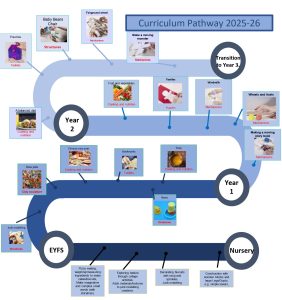
Our curriculum driver is that our teaching of Geography will help pupils gain knowledge of human and physical features as well as place and location.
We aim for children to confidently know that a geographer is a type of scientist who studies the earth, land and people. Geography lessons focus on developing observational skills, geographical skills and fieldwork through the themes as children work as geographers.
Whilst children work as geographers they will develop their knowledge of using and making maps as well as using aerial photographs. They will also learn to use their observational skills and use positional and directional language.
Geography Curriculum Pathway
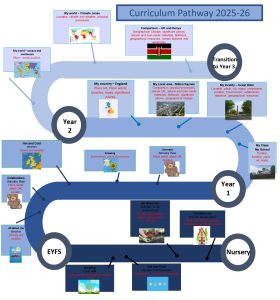
Our intent is that our teaching of History will help pupils gain a coherent knowledge and understanding of Britain and of the wider world.
We aim for children to confidently know that a historian is a person who studies and writes about the past. History lessons focus on developing historical skills and children working as historians. We intend for children to learn skills and gain knowledge which will enable them to learn about changes within their own living memory and gain knowledge and understanding of significant historical people places and events in their own locality.
As well as events from beyond living memory which are significant nationally or globally and learn about the lives of significant individuals who have contributed to National or International achievements.
History Curriculum Pathway
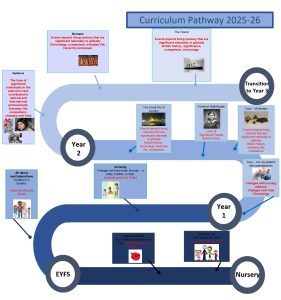
Children at Ashbrook School learn about music through listening, singing, playing, evaluating, analysing and basic composing.
Children develop a curiosity for the subject as we expose them to many different genres of music. We encourage children to express their feelings about different types of music and be able to share their opinions and preferences whilst also having respect for, and seeing the importance of, all genres.
Through the 'Kapow' program, we teach structured music lessons and also have a ‘Musician of the Month’ where children learn about, and hear the music of, different artists.
Music Curriculum Pathway
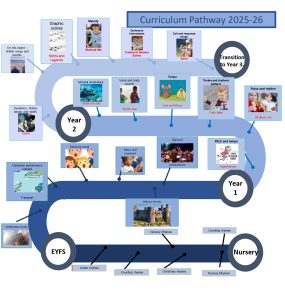
Music Development Plan 2024-2025 - click here to read our plan.
At Ashbrook School, our curriculum is inclusive and allows all pupils to access a range of physical activities. We ensure all pupils are willing to practise and take part in different activities, alone, in small groups and in teams, applying skills to achieve high levels of performance. Physical Education at Ashbrook School will develop pupil’s physical literacy and allows them to learn about themselves, the importance of healthy lifestyles, self-expression, decision making and social skills. We encourage pupils to be active throughout the PE lesson and employ creativity and imagination in their techniques, tactics and choreography. Our pupils will know how to collaborate and cooperate as part of an effective team, understanding fairness and equality of play to embed life-long values.
Ashbrook School provides a PE curriculum which carefully plans for progression and depth of skills through a series of lessons. In KS1, pupils take part in two sessions of physical activity each week, which provide challenge and enjoyable learning by using a range of sporting activities, such as: games, gymnastics and dance. Where possible children will make cross curricular links to other subjects, for example exploring themes and rhythm of music within dance. The EYFS has one formal PE session a week alongside the environmental physical environment of the Early Years curriculum. This focuses on fundamental movement skills, whereas KS1 move into more specific skills for sports and apply these in game situations.
Pupils are taught about how to handle equipment and move safely within gymnastics and games. Within lessons there is an emphasis on pupils being able to achieve their personal best and building resilience. Pupils are taught how to play fairly, creating a sense of teamwork, friendship and respect.
Staff are regularly given opportunities to take part in internal and external CPD opportunities (using a sports coach) to ensure that quality provision is continuous. Long term plans are used to set out units that are to be taught and ensure that the National Curriculum objectives and EYFS Goals are fully met. Within individual lessons the learning is differentiated in order to meet the needs of all pupils.
Pupils are given opportunities to take part in activities outside of their normal physical education lessons. There are extra-curricular clubs for pupils to attend which have a focus on Brazilian Football, gymnastics and dance. Our midday supervisors also support the pupils to be physical and provide the pupils with guided games and resources during the lunchtime play.
We are ‘PE Ready’ at Ashbrook School, meaning that we attend school in our PE kits ready to start each PE lesson.
PE Curriculum Pathway
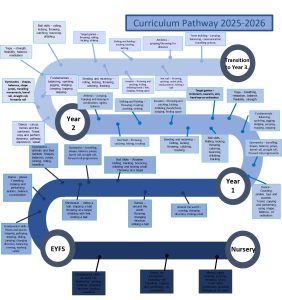
At Ashbrook School we believe that PSHE helps pupils to develop the knowledge, skills and attributes they need to thrive as individuals, family members and members of society. PSHE helps pupils to manage many of the most critical opportunities, challenges and responsibilities they will face growing up.
Our PSHE curriculum is based around three core themes:
- Relationships
- Living in the wider world
- Health and wellbeing
Relationships
At Ashbrook School we recognise that healthy respectful relationships are key to children’s wellbeing. In PSHE we learn about families and friendships and the different roles we have to play. We will encourage the children to recognise and celebrate diversity between families and individuals, while also identifying the many things we have in common. In PSHE and throughout the school day children will be encouraged to co-operate when playing and working and treat both others and themselves with respect.
Living in the Wider World
At Ashbrook School we want to prepare and enable our children to be responsible members of the community. In PSHE children will consider the rules we have and why these are necessary. They will be encouraged to think about how we can look after people, animals and the environment. As a school, we recognise that the internet is now a big part of people’s everyday life and will learn how we can use this safely.
Health and Wellbeing
The health and wellbeing of our pupils is our first priority at Ashbrook and is at the heart of everything we do. Specific PSHE sessions are set aside to focus on things such as exercise, healthy eating, and mental health, but there are many other things we do to ensure the wellbeing of our children is high.
SRE
Sex and relationships education (SRE) became compulsory for all schools as of September 2020. This aspect of PSHE is woven into the Relationships and Health and wellbeing sessions.
At Ashbrook School we follow the Milton Keynes syllabus for teaching Religious Education.
In Foundation, Religious Education is taught throughout the year within the 'Understanding the World' area of learning. We encourage families to share their own traditions, festivals and experiences and we learn about these in school. We use photos, stories and resources to let children explore and learn about these special times in the school year. Children begin to recognise that different families have different traditions, festivals and beliefs. At Ashbrook we celebrate the diversity of our ever-changing demographic.
In Key Stage 1 Religious Education (RE) is taught in half-termly units. The children primarily learn about Christianity and Judaism, however use every opportunity to learn about festivals and traditions from different faiths if they are celebrated by children within our school. When teaching Religious Education we use stories, photos, artefacts and resources. We also sometimes invite parents or visitors into school to talk to the children about their own experiences. Working together with our school community we are always happy to be contacted by families who wish for us to celebrate a special cultural occasion.
When children leave our school we hope they will have a good understanding that lots of families choose to belong to a faith. The children understand that different families may visit a place which is special to them and they may celebrate different festivals or have different traditions.
RE Curriculum Pathway
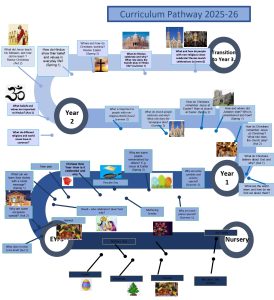
Our IFtL safety curriculum foundation is based on the National Curriculum and whole school Jigsaw PSHE Education (Personal, Social, Health and Economic Education) planned programme of learning through which children and young people acquire the knowledge, understanding and skills they need to successfully manage their lives – now and in the future. As part of a whole-school approach, PSHE Education develops the qualities and attributes pupils need to thrive as individuals, family members and members of society. This is subsequently built upon and personalised to our trust.
Each class contributes to our half termly Sway newsletter. This shows lots of ways in which celebrating the learning taking place in school. Photos, drawings, writing, quotes from children and staff are included which show events / activities the children have been doing.

